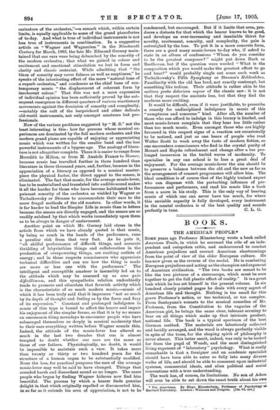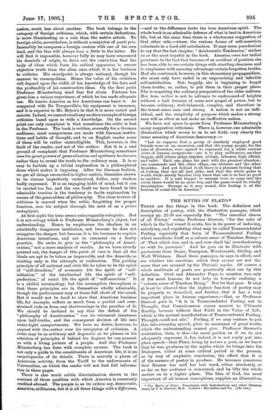SOME years ago Professor Miinsterberg wrote a book called American
Traits, in which he assumed the role of an inde- pendent and outspoken critic, and endeavoured to combat American prejudices and correct American shortcomings from the point of view of the older European culture. He has now given us the reverse of the medal. He is combating European prejudices and acting as the champion and exponent of American civilisation. " The two books are meant to be like the two pictures of a stereoscope, which must be seen together to get the full plastic effect of reality." It is a great task which he has set himself in the present volume. In six hundred closely printed pages he deals with every aspect of American life and, thought. Nothing is too small for this grave Professor's notice, or too technical, or too complex. From Santayana's sonnets to the musical comedies of Mr. Frohman, from the Constitution to the vagaries of the American girl, he brings the same clear, tolerant scrutiny to bear on all things which make up that intricate product, national life. The book is a typical specimen of the best German method. The materials are laboriously collected and lucidly arranged, and the wood is always perfectly visible in spite of the trees, for the shaping spirit of philosophy is never absent. This latter merit, indeed, was only to be looked for from the pupil of Wundt, and the moat distinguished living exponent of "laboratory" psychology. What is really remarkable is that a foreigner and an academic specialist should have been able to enter so fully into many diverse walks of life, and should be able to comment upon industrial systems, commercial ideals, and alien political and social conventions with a true understanding.
The work has, of course, its limitations. No eon of Adam will ever be able to set down the exact truth about his own
• The Americans. By Hngo Mansterberg, Professor of Psychology at Harvard University. London: Williams and Norgate. [12s. 6d. net.]
nation, much less about another. The book belongs to the category of foreign criticism, which, with certain deductions, is more illuminating as a rule than the native article. No foreign critic, nevertheless, is without a suspicion of parti prig. Insensibly he compares a foreign custom with one of his own land, and the bias will always lean a little to the latter. He will find it impossible, however fully he may have renounced his domicile of origin, to drive out the conviction that the body of ideas which form his critical apparatus is nearer objective truth than the alien ones which it is his business to criticise. His standpoint is always national, though his manner be cosmopolitan. Hence the value of his criticism will depend upon the width of his knowledge of his data and the profundity of his constructive ideas. On the first point Professor Miinsterberg need fear few rivals. Fortune has given him a unique experience, of which he has made adequate use. He knows America as few Americans can know it. As compared with De Tocqueville's, his equipment is immense, and it is superior to Mr. Bryce's in that it is more varied and minute. Indeed, we cannot recall any modern example of foreign criticism based upon so wide a knowledge. On the second point our only complaint is that sometimes the critic is lost in the Professor. The book is written avowedly for a German audience; most comparisons are made with German institu- tions and habits of thought, and to an English reader some of them will be rather unintelligible. This, however, is the fault of the reader, and not of the author. But it is a real ground of complaint that Professor Miinsterberg sometimes uses his great powers of generalisation and synthesis to obscure rather than to reveal the truth to the ordinary man. It is so easy to furbish up a trivial explanation in a philosophical dress which makes it imposing. After the German fashion, we get all things reconciled in higher unities, blemishes shown to be virtues imperfectly understood, follies only wisdom badly expressed. It is an engaging habit of mind, but it can be carried too far, and the one fault we have found in this admirable treatise is the tendency to facile explanation by means of the generalities of philosophy. The close texture of criticism is marred when the critic, forgetting his proper function, sees his subject through the mist of an a priori metaphysic.
At first sight the tone seems extravagantly eulogistic. But it is not eulogy which is Professor Miinsterberg's object, but understanding. Hence he emphasises the idealism in an admittedly dangerous institution, not because he does not recognise the danger, but because it is his business to explain American intentions, and not to comment on a faulty practice. He seeks to give us the " philosophy of Ameri- canism," not a mere analysis of results. As we have already pointed out, the danger of this point of view is that all the ideals are apt to be taken as impeccable, and the demerits as existing only in the attempts at realisation. The guiding principle of all national and civic life he takes to be the spirit of " self-direction," of economic life the spirit of " self- initiation," of the intellectual life the spirit of " self- perfection," of social life the spirit of " sell-assertion." It is a skilful terminology, but the assumption throughout is that these principles are in themselves wholly admirable, though the performance may at times fall short of the creed. But it would not be hard to show that American business life, for example, suffers as much from a partial and over- strained code as from any shortcomings in the practice of it. We should be inclined to say that the defect of the " philosophy of Americanism " was its vehement insistence upon half-truths, and the consequent division of life into water-tight compartments. We have no desire, however, to quarrel with the author over his categories of criticism. A critic may be as arbitrary and dogmatic as he pleases in his selection of principles if behind his dogmas he can present us with a living picture of a people. And this Professor Miinsterberg has done with complete success. The book is not only a guide to the constituents of American life, it is an encyclopaedia of its details. There is scarcely a phase of American activity, from the Tariff to the endowments of Universities, on which the reader will not find full informa- tion in these pages.
There is also much subtle discrimination shown in the account of those qualities with which America is commonly credited abroad. The people is, as its critics say, democratic, assertive,utilitarian, but it is all these things with a difference,
—and in the difference lurks the true American spirit. The whole book is an admirable defence of what is best in American life, but at the same time there is a wholesome suggestion of that other side,—where the various forms of self-assertion culminate in a hard self-satisfaction. It may seem paradoxical to say that the last chapter, "Aristocratic Tendencies," strikes us as the most hopeful in the book. America owes her initial greatness to the fact that because of an accident of position she has been able to see certain things with startling clearness and to emphasise with amazing advantage certain forgotten truths. Had she continued, however, in this elementary propagandism, she must only have ended in an unpromising and infertile self-satisfaction. But, happily, she is beginning to forget these truths, or, rather, to put them in their proper place. She is acquiring the ordinary perspective of the older nations.
Her true metier is not to advance to undreamed-of heights without a halt because of some new gospel of power, but to become ordinary, well-balanced, complex, and therefore in the truest sense sane and strong. A nation is not an indi- vidual, and the simplicity of purpose which makes a strong man will as often as not make an ineffective nation.
We have not space to quote from Professor Milnaterberg's many suggestive criticisms. There is, however, one admirable illustration which seems to us to set forth very clearly the inner meaning of American democracy ;—
" Let us suppose that a group of similarly employed good friends were on an excursion, and that the young people, for the sake of diversion, were agreed to represent for a while various sorts of human occupations—one is to play millionaire, another beggar, still others judge, teacher, artisan, labourer, high official, and valet. Each one plays his part with the greatest abandon ; one commands and the other obeys, one dictates and the other trembles. And yet behind it all there is a pleasant feeling that at bottom they are all just alike, and that the whole game is worth while merely because they know that one is in fact as good as another. If a real beggar or servant were to come into the circle there would be no more fun, and the game would be wholly meaningless. Strange as it may sound, this feeling is at the bottom of social life in America."







































 Previous page
Previous page